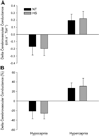Cerebrovascular responsiveness to steady-state changes in end-tidal CO2 during passive heat stress
- PMID: 18218916
- PMCID: PMC2826807
- DOI: 10.1152/japplphysiol.01040.2007
Cerebrovascular responsiveness to steady-state changes in end-tidal CO2 during passive heat stress
Abstract
This study tested the hypothesis that passive heat stress alters cerebrovascular responsiveness to steady-state changes in end-tidal CO(2) (Pet(CO(2))). Nine healthy subjects (4 men and 5 women), each dressed in a water-perfused suit, underwent normoxic hypocapnic hyperventilation (decrease Pet(CO(2)) approximately 20 Torr) and normoxic hypercapnic (increase in Pet(CO(2)) approximately 9 Torr) challenges under normothermic and passive heat stress conditions. The slope of the relationship between calculated cerebrovascular conductance (CBVC; middle cerebral artery blood velocity/mean arterial blood pressure) and Pet(CO(2)) was used to evaluate cerebrovascular CO(2) responsiveness. Passive heat stress increased core temperature (1.1 +/- 0.2 degrees C, P < 0.001) and reduced middle cerebral artery blood velocity by 8 +/- 8 cm/s (P = 0.01), reduced CBVC by 0.09 +/- 0.09 CBVC units (P = 0.02), and decreased Pet(CO(2)) by 3 +/- 4 Torr (P = 0.07), while mean arterial blood pressure was well maintained (P = 0.36). The slope of the CBVC-Pet(CO(2)) relationship to the hypocapnic challenge was not different between normothermia and heat stress conditions (0.009 +/- 0.006 vs. 0.009 +/- 0.004 CBVC units/Torr, P = 0.63). Similarly, in response to the hypercapnic challenge, the slope of the CBVC-Pet(CO(2)) relationship was not different between normothermia and heat stress conditions (0.028 +/- 0.020 vs. 0.023 +/- 0.008 CBVC units/Torr, P = 0.31). These results indicate that cerebrovascular CO(2) responsiveness, to the prescribed steady-state changes in Pet(CO(2)), is unchanged during passive heat stress.
Figures


References
-
- Allan JR, Crossley RJ. Effect of controlled elevation of body temperature on human tolerance to +Gz acceleration. J Appl Physiol. 1972;33:418–420. - PubMed
-
- Bill A, Linder J. Sympathetic control of cerebral blood flow in acute arterial hypertension. Acta Physiol Scand. 1976;96:114–121. - PubMed
-
- Claassen JA, Zhang R, Fu Q, Witkowski S, Levine BD. Transcranial Doppler estimation of cerebral blood flow and cerebrovascular conductance during modified rebreathing. J Appl Physiol. 2007;102:870–877. - PubMed
Publication types
MeSH terms
Substances
Grants and funding
LinkOut - more resources
Full Text Sources
Medical

